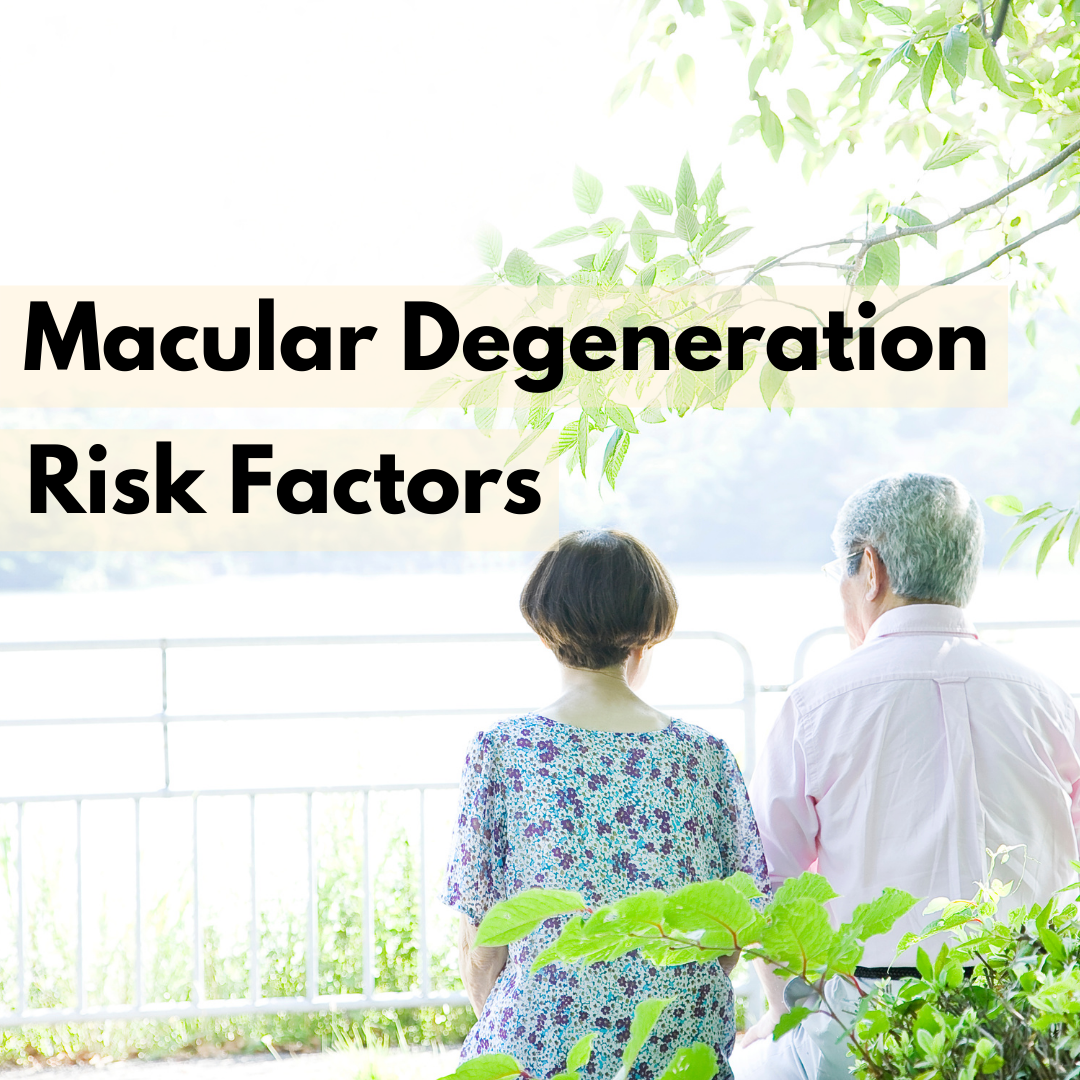Macular Degeneration Risk Factors

Age-Related Macular Degeneration is an eye disease that causes permanent loss of vision in the center of the retina. The condition typically occurs in individuals over the age of 60, which is why it is referred to as “age-related.”
When macular degeneration occurs, the macula of the eye is damaged. This oval-shaped pigmented part of the retina is responsible for the central vision of the eye, enabling you to read, drive, recognize faces and see in fine detail. 1
As Macular.Org explains, a good way to understand macular degeneration is to think of the eye as a camera with the macula being the most sensitive area of the film. When the macula “film” is working, it creates details images which it sends up the optic nerve to the brain. When the macula is damaged, images are not received to the brain properly. As the disease progresses, vision is wavy or blurred in the center. To continue the camera metaphor, it is as if the middle of the photograph you see is missing.

Macular degeneration progresses in stages, varying from little to no symptoms in early stages to a complete loss of central vision as the disease advances. There are a variety of macular degeneration risk factors which influence one’s likelihood of developing the disease.
Macular Degeneration Risk Factors
Age-related macular degeneration is the leading cause for vision loss in individuals 60 years and older, making age one of the leading causes for the disease. Other causes related to AMD are associated with genetics and lifestyle habits.
Factors Increasing Risk for AMD
Age
As the name of the disease suggested, the leading risk factor for age-related macular degeneration is age. Of those individuals in their 50s, 2% suffer from AMD while almost a third of individuals over 75 have the condition.2
Gender
Women appear to be at higher risk for AMD, comprising 2/3 of the individuals with the condition while men make up about 1/3.2
Race and ethnicity
White/Caucasian individuals are at the highest risk for age-related macular degeneration, followed by Chinese then Hispanic/Latinos.2
Those with lighter colored eyes are at an increased risk for AMD because their eyes are not able to protect the retina from sun damage as well as darker eyes.
Family History
Those with a family history of macular degeneration are at a risk 3-4 times greater to develop the disease. If you have parent or sibling who has been diagnosed with AMD, be sure to follow the proper lifestyle tips to help protect your eyes.3

Smoking
Smoking can increase someone’s risk for developing macular degeneration as it reduces the oxygen delivered throughout the body, including the eyes. This makes those who smoke at a risk four times greater of developing AMD than those who have never smoked.2
High Blood Pressure
Like smoking, high blood pressure reduces the oxygen delivered throughout the body, including the eyes, also increasing the risk for developing AMD.2
Cardiovascular/Heart Disease
Those who have suffered from stroke, angina or heart attack have an increased risk for developing AMD.2
Obesity/Overweight
Some studies show that individuals with a body mass index (BMI) over 30 are twice as likely to develop AMD than those who have a lower BMI.2
Sun Damage
The more time you spend in the sun, the more likely your eyes are to have suffered damage from the sun’s ultraviolet rays, increase the risk for AMD.2
Medications
Studies show that some medications increase the risk of AMD, including aspirin, nitroglycerin and some beta-blockers. It is important to discuss your medications with your health care professional.2
Diet and Alcohol
Diets that are high in fat and sugar increase the risk for AMD. It is important to opt for diets rich in green leafy vegetables.2
Imbibing in more than three alcoholic drinks a day may also increase the risk for AMD.2
Previous Cataract Surgery
Those who have undergone cataract surgery are at an increased risk for AMD.2
Managing Age-Related Macular Degeneration
If diagnosed with age-related macular degeneration, it is important to understand that your journey is unique. The progression and symptoms occur at different rates for everyone and taking the proper steps to manage the disease help you prevent further damage from occurring.
Maintaining Eye Health
It is never too early to think about your eye health and vision. If your genetic and lifestyle factors put you at a higher risk for macular degeneration, take steps now toward healthier vision by adjusting your diet and lifestyle and add the proper eye health supplements to your regimen.
If you are concerned that you may have the disease after reading this list of macular degeneration risk factors, visit your eye doctor today.
1 Macular Org
2 WebMD
3 Berkelye Eye Center
These statements have not been evaluated by the FDA. This product is not intended to diagnose, treat, cure, or prevent any disease.


